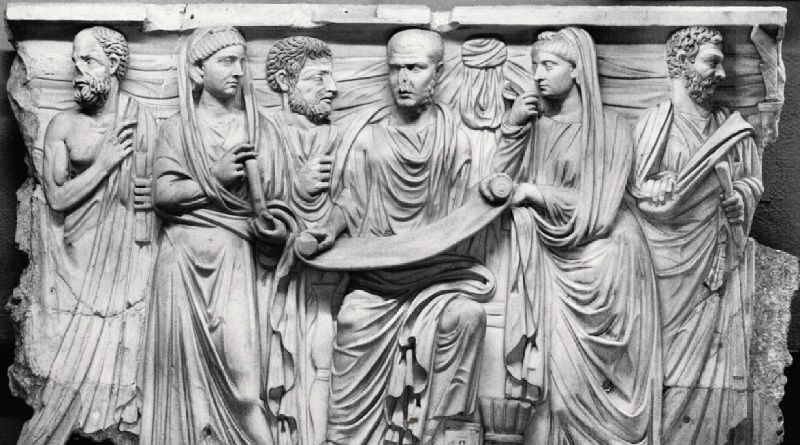The Pursuit of Pleasure: the Material World of Epicurus
Achieve pleasure and eliminate pain. This, in a compressed nutshell, sums up the ethics of Epicurus. Born in 341 BCE in Samos, Greece, he taught that pleasure is the absence of physical pain and mental distress, and that the key to achieving this is living a virtuous and simple life, free from fear of the gods and death.
Epicureanism was of significant influence on the development of Western philosophy and continues to be studied today.
i. Material Definition of Human Nature
The starting point of Epicurus’s philosophy is his material definition of human nature. Epicurus defined human nature in terms of the physical, material composition of the human body and soul. He believed that the soul is made up of atoms, just like the body, and that it is mortal and perishes with the body at death, resulting in the end of consciousness and perception. He also believed that all human actions, thoughts, and feelings are ultimately caused by the movement and interactions of atoms within the body and soul.
Epicurus argued that we have natural desires, such as the desire for food, drink, and sex, which are necessary for our survival, and of which we should not be ashamed. He also argued that there are unnecessary desires, such as the desire for wealth, power, and fame. These bring more pain than pleasure. By understanding the nature of our desires and learning to distinguish between necessary and unnecessary desires, we can live a virtuous and happy life.
In this way, Epicurus believed that by understanding the material nature of the human body and soul, we can gain insight into human behaviour and make choices that lead to pleasure and avoid pain.
His material definition of human nature was influenced by his belief in atomism, which holds that all matter is made up of indestructible and eternal atoms that move and combine to form the physical world. This was a departure from the traditional Greek belief in the immortality of the soul.
The notion of atomism was first introduced by the ancient Greek philosopher Leucippus and his pupil Democritus, in the 5th century BCE, as an explanation for the nature of matter and its changes.
DEMOCRITUS AND LEUCIPPUS
Leucippus and Democritus proposed the universe is made up of an infinite number of atoms that are in constant motion. These atoms come in different shapes and sizes and their combinations and arrangements are what create the diversity of the natural world.
Both Democritus and Leucippus believed that the natural world is governed by mechanical causes, and that everything can be explained by the movement and interaction of atoms.
Moreover, they concluded that the universe is infinite and eternal and that the soul is also made up of atoms, which are then dispersed at death, ideas eventually taken up by Epicurus and which we will explore in a moment.
Epicurus would adopt the idea that the natural world is governed by mechanical causes, and that everything can be explained by the movement and interactions of atoms. He would also adopt the idea that atoms have no qualities or properties other than shape, size, and position. The qualities of things, such as colour, taste, and temperature, are not properties of atoms themselves, but the result of the way atoms are arranged.
Moreover, Epicurus would adopt this atomism and apply it to his moral theory, arguing that all human actions, thoughts and feelings are ultimately caused by the movement and interactions of atoms within the body and soul.
ii. Fear of Death and Superstitions
Epicurus believed that the fear of death is a natural and irrational fear that arises from a misunderstanding of what death is.
This is how he runs his argument:
- First, death is the end of consciousness and perception.
- Second, we do not exist during death.
- Therefore, since we do not exist during death, and it cannot be felt, there is nothing to fear.
He wrote, “Death, the most terrifying of ills, is nothing to us, since so long as we exist, death is not with us; but when death comes, then we do not exist.”
Epicurus also believed that superstitions and religious beliefs about death, such as the belief in an afterlife and punishment or reward, were unfounded and served only to increase fear and anxiety. We should be avoiding fear and anxiety, not fuelling them.
He taught that the gods were distant, uninvolved beings, completely indifferent to human affairs. He did not deny their existence, but claimed that they were entirely separate from human affairs and did not intervene in the natural world. Instead, they were perfect and immortal beings who lived in a state of eternal pleasure. Instead of fearing and worshipping them, we should admire them for their perfection and happiness.
Epicurus also taught that the gods were not responsible for creating the world or for guiding its development. Instead, he claimed that the universe had always existed and that natural laws governed its functioning.
Therefore, by understanding the true nature of death and eliminating superstitions and false beliefs, one could overcome fear and lead a happy and fulfilled life.
iii. Epicurean Pleasure-Seeking Principle
A central tenet of Epicurean philosophy is the pleasure-seeking principle, also known as the “doctrine of pleasure.” Seeking pleasure and avoiding pain is the ultimate goal of human life.
In this, he was influenced by the Cyrenaics, a group of ancient Greek, 4th century BCE philosophers from the city of Cyrene. They were known for their hedonistic philosophy, claiming that pleasure is the ultimate goal of human life, and that virtue is whatever leads to pleasure. Pain is the only intrinsic bad, and pleasure is the only intrinsic good. All actions should be guided by the pursuit of pleasure, and avoidance of pain is a secondary concern. The Cyrenaics also believed that pleasure is subjective, that is, that what is pleasurable for one person may not be pleasurable for another. The ultimate goal should be to maximise one’s own pleasure.
Epicurus developed his own philosophy of pleasure, claiming that pleasure and pain are the ultimate criteria for determining what is good and bad. All other values, such as virtue, are subordinate to this principle; in other words, virtue is not an end in itself, but rather a means to an end. He believed that virtue is necessary for achieving the ultimate goal of human life, which is to seek pleasure and avoid pain. Virtues like wisdom, justice, and moderation are essential for attaining true pleasure and avoiding pain, while virtues like courage, liberality, and truthfulness are necessary for living a harmonious life with others.
Epicurus argued that virtues are not naturally good or bad, but they are good or bad depending on the consequences they produce. So, in this sense, Epicureanism is a consequentialist ethic. A virtue is good if it leads to pleasure and bad if it leads to pain. Therefore, virtues like wisdom and moderation are good because they allow us to live a peaceful and fulfilled life, by helping us to avoid unnecessary pain and to reach pleasure without excess.
Epicurus distinguished between two types of pleasure: kinetic and static.
Kinetic pleasure is the pleasure of motion, such as the pleasure of eating and drinking. Static pleasure is the pleasure of rest such as the pleasure of being at peace. Our ultimate goal would be to achieve a state of static pleasure, a state of tranquillity and freedom from pain.
However, it is worth noting that Epicurus didn’t advocate for a hedonistic lifestyle, where one would pursue any kind of pleasure without restraint. Rather, he argued that the pursuit of pleasure should be guided by reason and wisdom. That pursuit should be balanced with the avoidance of pain. Some pleasures, such as those gained at the expense of one’s health or reputation, should be avoided.
Epicurus held that virtue and moral behaviour are acquired through habit and custom, rather than reason or innate principles. The key to a virtuous and happy life is to develop good habits that lead to pleasure and avoid pain. By repeating virtuous actions, we can train our minds and bodies to naturally seek out pleasure. This process of habituation, or repetition, leads to a natural inclination towards virtue, and that it becomes part of one’s character over time.
Conversely, Epicurus also held that bad habits can lead to vice and unhappiness. By repeating actions that lead to pain and avoiding actions that lead to pleasure, we can train our minds and bodies to seek out pain and avoid pleasure. This can lead to a natural inclination towards vice.
By understanding the different types of desires, Epicurus believed that we can then make better choices about how to live our lives. By understanding the nature of pleasure, we can learn to distinguish between necessary and unnecessary desires.
Some desires are natural and necessary for our well-being, such as the desire to eat when we are hungry. These are desires necessary for our survival and should be pursued.
On the other hand, some desires are unnatural and unnecessary, such as the desire for wealth, power, and fame. These desires bring more pain than pleasure, because they are often difficult to attain and are accompanied by fear, anxiety, and other negative emotions.
Furthermore, Epicurus believed that some pleasures can be unnatural, not because they are unnecessary, but because they are harmful. Excessive indulgence in pleasures such as food, drink, or sex, can lead to pain and suffering.
Therefore, the key to achieving pleasure is to understand its nature and to moderate our desires and indulgences, in order to avoid excesses and pains.
In this sense, Epicurus was heavily influenced by Aristotle, although they had some fundamental differences in their views. Like Aristotle, he believed in the importance of a virtuous life and the study of natural philosophy. Both philosophers believed that virtue is acquired through habit and custom, training the mind and body to naturally seek out pleasure and avoid pain. There are also parallels between Epicurus’s moderation and Aristotle’s concept of the Golden Mean.
They do, however, diverge in what they consider to be the ultimate goal of human life. For Aristotle, this was to achieve eudaimonia, a state of flourishing by living a virtuous life, whereas, for Epicurus, the ultimate goal is to achieve pleasure and eliminate pain.
iv. Conclusion
Epicurus is considered an important philosopher for several reasons, not least his influence on many philosophers throughout history.
The Roman poet Lucretius wrote an epic poem called “De Rerum Natura” (On the Nature of Things) which was heavily influenced by Epicurean philosophy and sought to explain Epicurean teachings to a Roman audience.
In the 17th century, French philosopher and scientist Pierre Gassendi developed a materialist philosophy heavily influenced by Epicurean philosophy and the atomism of Democritus.
18th century Scottish philosopher David Hume developed a philosophical system that emphasised the importance of pleasure and the avoidance of pain as the ultimate goal of human life. Moral judgements are based on the pleasure or pain that an action causes. Like Epicurus, Hume believed that the key to a happy and virtuous life is to understand the nature of pleasure and pain and to make choices that lead to the greatest balance of pleasure over pain.
Hume also shared Epicurus’s view that moral virtues are acquired through habit and custom, rather than reason or innate principles. Similarly, he believed that moral virtues are developed through the repetition of virtuous actions, and that they become a natural part of one’s character over time.
Also in the 18th century, Jeremy Bentham developed utilitarianism, holding that the rightness or wrongness of an action are determined by its ability to produce pleasure or pain. He was heavily influenced by Epicurean philosophy and believed that the ultimate goal of human life is the greatest amount of pleasure for the greatest number of people.
Ludwig Wittgenstein, in the 20th century, was influenced by Epicurean philosophy in his views on the nature of language and meaning. Epicurus believed that language is a human invention created to communicate our thoughts and feelings to others, a belief also shared by Wittgen. He argued that words do not have any inherent meaning, but rather that meaning is created by the way people use words in their everyday lives. Wittgenstein’s later philosophy, known as his “language-games” theory, is similar to Epicurus’s view that meaning is created by the way words are used in a given context. Words have meaning only in the context of a language-game, or a specific social activity in which they are used, and that understanding the meaning of a word requires the rules of the language-game in which it is used.
Epicurus’s comprehensive philosophical system, his emphasis on personal autonomy, his influence on later philosophical movements, his contributions to the development of science, and his emphasis on reason and critical thinking, make him an important figure in Western philosophy.
Below are highly-suggested follow-up readings:



